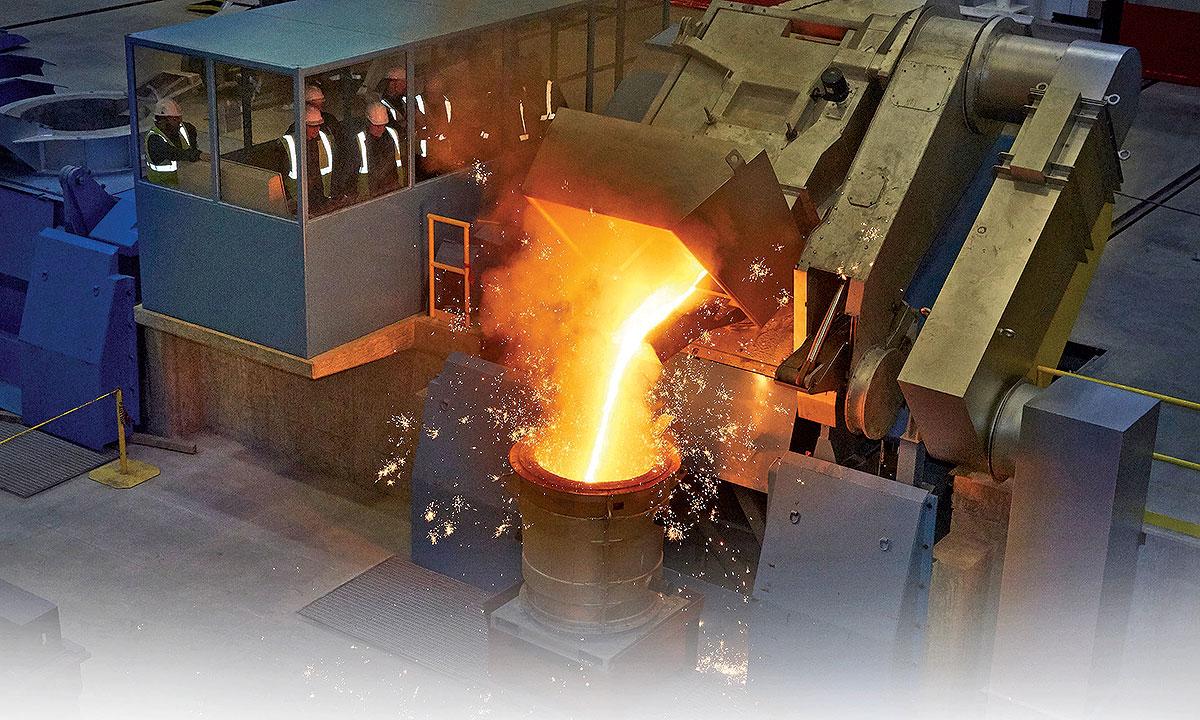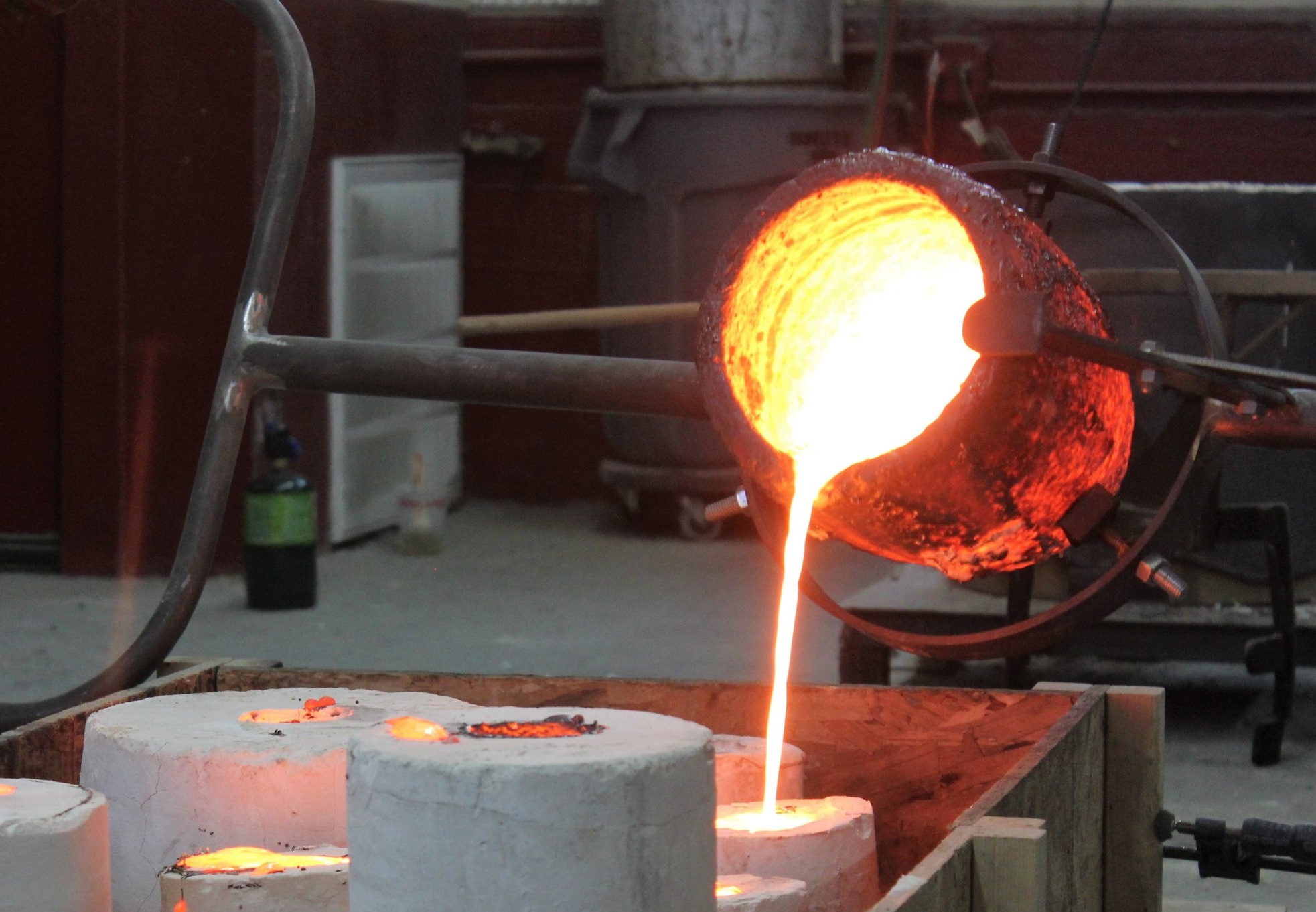Top Technological Advances Transforming the Metal Foundry Sector
Wiki Article
A Comprehensive Overview to Metal Casting: Advantages and Services Used by Foundries
Metal casting is an important process in various sectors, offering many advantages through the services of factories. These facilities change molten metal right into accurate and resilient elements, providing to specific customer requirements. By utilizing sophisticated modern technologies, foundries assure top quality and performance in manufacturing. The details of metal casting and the diverse strategies entailed increase essential questions regarding its function in modern-day production. What innovations exist in advance in this important field?Comprehending the Metal Casting Process
The metal casting process is an essential method made use of in manufacturing to produce complicated forms and elements. This approach includes pouring liquified metal into a mold and mildew developed to form the desired things. The process begins with pattern development, which functions as a layout for the mold and mildew. Aluminum Foundry. Different materials, such as sand, metal, or ceramic, are utilized for mold-making, depending upon the specific requirements of the casting
Once the mold and mildew is ready, molten metal is put into it and permitted to cool down and strengthen. After solidification, the mold is removed, disclosing the actors part. Various techniques, including sand casting, financial investment casting, and die casting, are employed, each suited to various applications and materials. Quality control steps, such as evaluations and testing, are important to ensure the end product fulfills specs. Overall, the metal casting process plays an essential role in producing components for sectors varying from vehicle to aerospace.
Trick Benefits of Metal Casting
Metal casting supplies significant advantages that make it a preferred manufacturing method in different markets. Its design adaptability and accuracy permit detailed shapes, while cost-efficient mass manufacturing improves effectiveness. Furthermore, the versatility and stamina of materials used in casting add to the durability of the end products.Style Flexibility and Accuracy
Releasing impressive layout flexibility and accuracy, metal casting enables developers and designers to produce complex shapes and functions that would be difficult or difficult to accomplish with other producing methods. This capacity enables the production of complicated geometries, inner structures, and fine details that enhance item functionality and aesthetic appeals. In addition, various casting techniques, such as sand casting, financial investment casting, and die casting, offer more choices for personalization, fitting varied material residential properties and job requirements. The adaptability of mold and mildews permits modifications throughout the layout stage, simplifying the change from concept to end product. Inevitably, metal casting stands out for its ability to provide high-precision components, making it an invaluable process in markets varying from vehicle to aerospace and past.Cost-Effective Automation
Cost-effective automation stands as one of the primary advantages of metal casting, enabling suppliers to produce huge amounts of elements at a lower cost each. This efficiency occurs from the capability to develop elaborate molds that can be reused several times, substantially minimizing arrangement and operational expenses. Furthermore, metal casting processes, such as sand casting and pass away casting, enable high throughput, making it possible to fulfill the demands of large manufacturing runs. The decreased product waste and energy usage better improve expense financial savings, making metal casting an attractive option for industries needing mass parts. Overall, the economical nature of metal casting placements it as a preferred technique for makers intending for financial performance in their manufacturing processes.Material Convenience and Stamina
One of the standout features of metal casting is its amazing material convenience, which enables for the use of a wide variety of metals and alloys. This flexibility makes it possible for makers to choose products that ideal suit their details applications, from light weight aluminum and bronze to iron and steel. Each metal uses unique residential or commercial properties, including varying degrees of strength, deterioration resistance, and thermal conductivity. Metal casting can generate parts that satisfy strict performance demands throughout varied markets, such as vehicle, aerospace, and construction. Additionally, the toughness of cast steels can be enhanced with various treatment procedures, guaranteeing longevity and durability. Aluminum Foundry. Overall, the combination of material versatility and inherent toughness makes metal casting a recommended selection for producing high-quality partsKinds Of Metal Casting Methods
Metal casting incorporates a selection of methods that provide to different production demands and product residential properties. Usual approaches consist of sand casting, which utilizes a sand mold for complex forms, and investment casting, understood for its accuracy and surface area finish. Die casting is an additional method that utilizes high-pressure injection of molten metal right into mold and mildews, suitable for automation of tiny components.Shell molding offers a faster different, making use of a resin-coated sand to create thin-walled mold and mildews, while shed foam casting permits for complex layouts without the need for a core.
Additionally, continual casting is used for generating long sections of metal, such as bars or sheets, by solidifying liquified metal in a continual process. Each technique provides unique benefits and is selected based on elements like the called for information, production quantity, and material kind, ensuring premium results in metal fabrication throughout numerous sectors.
The Duty of Foundries in Metal Casting
Shops play a crucial function in the metal casting process, acting as the centers where molten metal is transformed right into completed items. These specialized facilities are furnished with the necessary tools and technologies to handle various steels, making certain high-grade results. Factories are in charge of several essential features, including melting the metal, pouring it right into molds, and enabling it to strengthen.In addition, they preserve stringent safety and ecological criteria to secure employees and minimize ecological influence. Proficient technicians and designers collaborate to optimize casting processes, improving performance and decreasing waste. Foundries likewise take part in high quality control steps, making certain that the last items meet certain tolerances and requirements. This quality control is important for markets that rely upon exact components, such as automobile and aerospace. Consequently, factories add significantly to the helpful hints general production landscape, allowing technology and growth across different markets.
Custom-made Metal Casting Services
Customized metal casting services use tailored style solutions that satisfy certain client requirements. These solutions additionally provide product selection proficiency, making certain the ideal metal is chosen for the preferred application. Such versatility and expertise improve the total quality and efficiency of the last item.
Tailored Style Solutions
Customized style remedies in metal casting provide suppliers with the versatility to produce components that fulfill details efficiency and visual demands. Foundries supply customized solutions that enable customers to specify measurements, forms, and surface finishes to accomplish preferred results. This customization procedure frequently consists of collaboration in between designers and developers, making certain that the final products line up with operational needs and market requirements. Advanced innovations, such as computer-aided design (CAD) and simulation software application, make it possible for precise modeling and screening of parts before manufacturing, minimizing mistakes and improving efficiency. By leveraging tailored layout remedies, services can optimize functionality while lowering waste and expenses, eventually causing an extra one-upmanship out there. This adaptability is important for sectors calling my website for unique applications and specs.Material Choice Expertise
When choosing products for metal casting, know-how plays a crucial function in making sure that the ideal option aligns with both efficiency needs and cost-effectiveness. Factories utilize experienced specialists that recognize the residential or commercial properties of different steels and alloys, allowing them to suggest ideal materials for certain applications. Elements such as stamina, corrosion resistance, and thermal conductivity are carefully taken into consideration to fulfill the client's needs. In addition, market fads and improvements in material science inform these choices, allowing shops to stay competitive. By leveraging their competence, foundries can aid customers in steering via facility product alternatives, inevitably bring about enhanced item high quality and decreased manufacturing prices. This specific understanding is essential for achieving successful outcomes in customized metal casting services.High Quality Control in Metal Casting
Quality assurance in metal casting is critical to ensure that the final items satisfy the needed requirements and performance requirements. Foundries utilize a range of strategies and approaches to guarantee the best quality of cast parts. This process starts with rigid material examinations, confirming that raw materials comply with sector criteria. Throughout the casting process, real-time tracking and testing are performed to examine specifications such as temperature level, mold and mildew stability, and dimensional precision.
Applications of Metal Castings Across Industries
Metal spreadings play an important duty in numerous sectors, acting as the foundation for many applications. In the auto field, cast components such as engine blocks and transmission housings are required for vehicle efficiency and reliability. The aerospace market relies on accuracy spreadings for vital components that ensure safety and efficiency in flight. Furthermore, the construction market makes use of metal spreadings for components, installations, and architectural aspects, boosting the toughness of buildings and facilities.The energy sector benefits from castings utilized in wind turbine blades and other equipment necessary for power generation. The medical field additionally uses metal castings in gadgets and instruments, demonstrating the adaptability of this manufacturing procedure. Overall, metal castings are important to the performance and development of varied sectors, showcasing their importance in modern technology and framework development
Often Asked Concerns
What Materials Are Generally Used in Metal Casting?
Common materials used in metal casting consist of aluminum, iron, brass, bronze, and steel. Each material offers distinct homes ideal for different applications, enabling makers to pick the very best choice based upon deterioration, stamina, and weight resistance.For how long Does the Metal Casting Refine Usually Take?
The metal casting process typically takes numerous hours to a few days, depending on elements such as the intricacy of the style, sort of metal made use of, and the specific casting technique used by the factory.
What Is the Ecological Effect of Metal Casting?
The ecological influence of metal casting includes energy usage, exhausts, and waste generation. Factories frequently execute measures to alleviate these effects, such as recycling products and using cleaner innovations to reduce their environmental footprint.Can Metal Casting Be Provided For Small-Scale Projects?
Metal casting can undoubtedly be done for small-scale jobs. Different factories satisfy such needs, using customized remedies that fit restricted production runs while preserving top quality and his comment is here precision in the final products.What Are the Precaution in Metal Casting Foundries?
In metal casting factories, security steps consist of personal protective tools, appropriate ventilation, training on equipment use, emergency procedures, routine upkeep checks, and adherence to market safety and security requirements to lessen dangers connected with molten metal and hazardous products.Furthermore, metal casting processes, such as sand casting and pass away casting, permit for high throughput, making it possible to fulfill the needs of massive manufacturing runs. One of the standout qualities of metal casting is its impressive material adaptability, which enables for the usage of a wide variety of alloys and steels. Additionally, continual casting is made use of for creating lengthy sections of metal, such as sheets or bars, by solidifying liquified metal in a constant procedure. Foundries play a pivotal role in the metal casting process, offering as the centers where molten metal is changed into ended up products. Usual materials utilized in metal casting consist of aluminum, iron, bronze, steel, and brass.
Report this wiki page